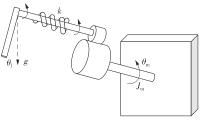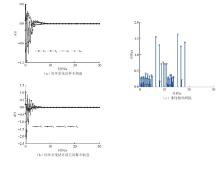| 1 |
CHANG X H, XIONG J, LI Z M,et al .Quantized static output feedback control for discrete-time systems[J].IEEE Transactions on Industrial Informatics,2017,14(8):3426-3435.
|
| 2 |
HUYNH V T, NGUYEN C M, TRINH H .Static output feedback control of positive linear systems with output time delays[J].International Journal of Systems Science,2019,50(15):2815-2823.
|
| 3 |
BERRNARD P, ANDRIEU V, ASTOLFI D .Observer design for continuous-time dynamical systems[J].Annual Reviews in Control,2022,53:224-248.
|
| 4 |
LUO S, DENG F, CHEN W-H .Stability and stabilization of linear impulsive systems with large impulse-delays:a stabilizing delay perspective[J].Automatica,2021,127:109533/1-7.
|
| 5 |
NIAMSUP P, PHAT V N .State feedback stabilization of linear descriptor time-varying delay systems[J].Transactions of the Institute of Measurement and Control,2020,42(12):2191-2197.
|
| 6 |
冯智辉,邓飞其,刘文辉 .一类二次型离散系统的有限时间稳定与镇定[J].华南理工大学学报(自然科学版),2015,43(1):9-14.
|
|
FENG Zhi-hui, DENG Fei-qi, LIU Wen-hui .Finite-time stability and stabilization for a class of quadratic discrete-time systems[J].Journal of South China University of Technology (Natural Science Edition),2015,43(1):9-14.
|
| 7 |
WANG Y, LI X .Impulsive observer and impulsive control for time-delay systems[J].Journal of the Franklin Institute,2020,357(13):8529-8542.
|
| 8 |
CHEN W-H, CHENG L, LU X .Observer-based feedback stabilization of Lipschitz nonlinear systems in the presence of asynchronous sampling and scheduling protocols[J].Nonlinear Analysis:Hybrid Systems,2019,33:282-299.
|
| 9 |
黄俊华,胥布工,陈立定 .信息物理融合系统的分布式采样控制[J].华南理工大学学报(自然科学版),2019,47(2):31-40.
|
|
HUANG Junhua, XU Bugong, CHEN Liding .Distributed sampled-data control of cyber-physical systems[J].Journal of South China University of Technology (Natural Science Edition),2019,47(2):31-40.
|
| 10 |
LUO S, DENG F, ZHAO X,et al .Stochastic stabilization using aperiodically sampled measurements[J].Science China:Information Sciences,2019,62(9):1-11.
|
| 11 |
FU X, KANG Y, LI P,et al .Control for a class of stochastic mechanical systems based on the discrete-time approximate observer[J].Journal of Systems Science and Complexity,2019,32(2):526-541.
|
| 12 |
LING C, KRAVARIS C .Multirate sampled-data observer design based on a continuous-time design[J].IEEE Transactions on Automatic Control,2019,64(12):5265-5272.
|
| 13 |
KARAFYLLIS I, AHMED-ALI T, GIRI F .A note on sampled-data observers[J].Systems & Control Letters,2020,144:104760/1-8.
|
| 14 |
MAZENC F, FRIDMAN E .Predictor-based sampled-data exponential stabilization through continuous-discrete observers[J].Automatica,2016,63:74-81.
|
| 15 |
SFERLAZZA A, TARBOURIECH S, ZACCARIAN L .State observer with Round-Robin aperiodic sampled measurements with jitter[J].Automatica,2021,129:109573/1-10.
|
| 16 |
DAM Q T, THABET R E H, ALI S A,et al .Observer design for a class of uncertain nonlinear systems with sampled-delayed output using high-gain observer and low-pass filter:application for a quadrotor UAV[J].IEEE Transactions on Industrial Electronics,2023,71(1):933-942.
|
| 17 |
HEEMELS W P M H, JOHANSSON K H, TABUADA P .An introduction to event-triggered and self-triggered control[C]∥ Proceedings of the 51st IEEE Conference on Decision and Control.Maui:IEEE,2012:3270-3285.
|
| 18 |
WU L, GAO Y, LIU J,et al .Event-triggered sliding mode control of stochastic systems via output feedback[J].Automatica,2017,82:79-92.
|
| 19 |
HUONG D C, HUYNH V T, TRINH H .Dynamic event-triggered state observers for a class of nonlinear systems with time delays and disturbances[J].IEEE Transactions on Circuits and Systems Ⅱ:Express Briefs,2020,67(12):3457-3461.
|
| 20 |
GE X, HAN Q L, DING L,et al .Dynamic event-triggered distributed coordination control and its applications:a survey of trends and techniques[J].IEEE Transactions on Systems,Man,and Cybernetics:Systems,2020,50(9):3112-3125.
|
| 21 |
孙子文,刘加磊 .工业信息物理系统间隙DoS攻击的自适应事件触发稳定控制[J].华南理工大学学报(自然科学版),2023,51(3):146-156.
|
|
SUN Ziwen, LIU Jialei .Adaptive event-triggered stability control for intermittent DoS attacks in industrial cyber physical systems[J].Journal of South China University of Technology (Natural Science Edition),2023,51(3):146-156.
|
| 22 |
DINH C H .On event-triggered robust observer-based control problem of one-sided Lipschitz time-delay systems[J].Asian Journal of Control,2022,24(5):2234-2243.
|
| 23 |
PETRI E, POSTOYAN R, ASTOLFI D,et al .Decentralized event-triggered estimation of nonlinear systems[EB/OL].(2022-10-07)[2023-01-05]..
|
| 24 |
刘文辉,邓飞其,任红卫,等 .具有测量噪声的领导者跟随者系统跟随控制[J].华南理工大学学报(自然科学版),2014,42(8):45-51.
|
|
LIU Wen-hui, DENG Fei-qi, REN Hong-wei,et al .Tracking control of multi-agent systems with an active leader and measurement noises[J].Journal of South China University of Technology (Natural Science Edition),2014,42(8):45-51.
|
| 25 |
BATTILOTTI S .Robust observer design under measurement noise with gain adaptation and saturated estimates[J].Automatica,2017,81:75-86.
|
| 26 |
ESFANDIARI K, SHAKARAMI M .Bank of high-gain observers in output feedback control:robustness analysis against measurement noise[J].IEEE Transactions on Systems,Man,and Cybernetics:Systems,2021,51(4):2476-2487.
|
| 27 |
PRASOV A A, KHALIL H K .A nonlinear high-gain observer for systems with measurement noise in a feedback control framework[J].IEEE Transactions on Automatic Control,2012,58(3):569-580.
|
| 28 |
CHEN W-H, SUN H, LU X .A variable gain impulsive observer for Lipschitz nonlinear systems with measurement noises[J].Journal of the Franklin Institute,2022,359(18):11186- 11207.
|
| 29 |
CHEN W-H, ZHENG W X .Robust stabilization of delayed Markovian jump systems subject to parametric uncertainties[C]∥ Proceedings of the 46th IEEE Conference on Decision and Control.New Orleans:IEEE,2007:3054-3059.
|
| 30 |
CHEN W-H, YANG W, ZHENG W X .Adaptive impulsive observers for nonlinear systems:revisited[J].Automatica,2015,61:232-240.
|
| 31 |
RAFF T, KOGEL M, ALLGOWER F .Observer with sample-and-hold updating for Lipschitz nonlinear systems with nonuniformly sampled measurements[C]∥Proceedings of 2008 American Control Conference.Seattle:IEEE,2008:5254-5257.
|



